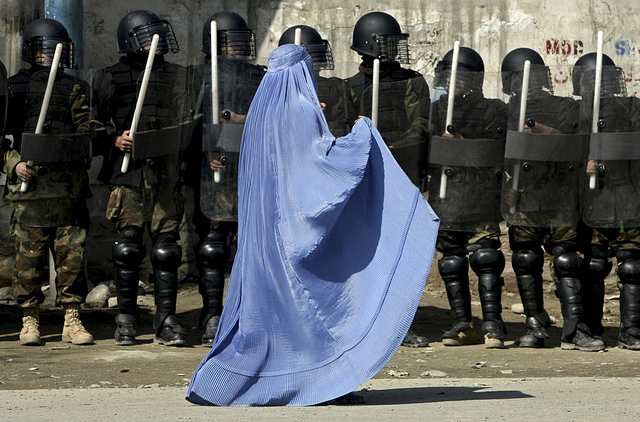- About
- Topics
- Picks
- Audio
- Story
- In-Depth
- Opinion
- News
- Donate
- Signup for our newsletterOur Editors' Best Picks.Send
Read, Debate: Engage.
| September 22, 2016 | |
|---|---|
| topic: | Economic Inclusion |
| tags: | #Afghanistan, #WOT, #World Trade Organization, #Kabul |
| located: | Afghanistan |
| by: | Shadi Khan Saif |
Upon witnessing the trade of currency exchange in the Afghan capital Kabul’s main bazaar, one feels like time has stopped here somewhere in the 19th century. Traders literally trade while walking, holding piles of local and foreign currencies in their hand, and a small Chinese digital calculator in their pocket to calculate the sum.
Even for trading thousands of dollars at this Sara-e-Shahzada Market, you don’t need to show any identity or documents, just the good old style give and take works here. That has been the case with much of the economic affairs, and for that matter most affairs in this war-torn country, which is passing through a ‘decade of transition’ according to its leadership.
Afghanistan only joined the elite global trade body World Trade Organization (WTO) less than a month ago. But can that do any wonders in helping the land-locked country marred by the brutal insurgency, rampant corruption and political instability to match the pace with which the world around it is changing? Opinions are divided.
Azarakhsh Hafizi, Chairman of the Committee on International Affairs at the Afghanistan Chambers of Commerce (ACCI) is both happy and concerned. “We worked for over a decade to pave the ground for it (WTO membership), we ensured proper legislation and met a number of other requirements necessary for becoming member of the WTO”, he recalled.
Hafizi told Fair Planet that unfortunately the National Unity Government (NUG) in Afghanistan is more focused on matters related to internal politics and has little time and interest towards improving the economy that can lead the country out of poverty.
Among the 164 members of the WTO, Afghanistan is one of the poor if not the poorest despite having an abundance of mineral resources, sufficient water and land for agriculture but severely lacking the expertise for industrial growth.
The challenges ahead for Afghanistan to use this opportunity for transforming its aid-addicted economy are enormous. According to the Transparency International, Afghanistan remains among the top three most corrupt countries in the world. And, not to mention the ragging conflict that is claiming at least 10 civilian lives on a daily basis.
According to the United Nations Assistance Mission in Afghanistan (UNAMA), 1,601 civilian died and 3,565 more got injured in the first six months of 2016. The total civilian casualty figure recorded by the UN between 1 January 2009 and 30 June 2016 has risen to 63,934, including 22,941 deaths and 40,993 injured.
In spite of all this, analysts believe the inclusion in this global trade body is indeed valuable for a country facing so many troubles for such a long time.
Alias Wardak, an economic expert believe WTO membership is just what Afghanistan needs to realize its dream of becoming a hub for trade of goods and services between the energy-rich Central Asia and the fast growing South Asian countries. The Afghan government under the President Mohammad Ashraf Ghani is pursuing a rigorous plan in this regard.
Afghanistan is signatory to a number of mega energy projects in the region such as the Tajikistan Afghanistan Pakistan and India (TAPI) gas pipeline project and Central Asia South Asia (CASA-1000).
Noting the benefits of the WTO membership for Afghanistan, Wardak also underlined the flip side of it.
“On the other side, a point of concern will be how Afghanistan’s products can compete with those from Pakistan, Iran, Central Asian countries, China and India. Finding the balance between encouraging the “Made in Afghanistan” and provide fair opportunities for the products of other WTO members, will be one of the greatest challenges”, he told Fair Planet.
Observers believe Afghanistan will be expected to do certain things to maintain its standing in the WTO, which also means lowering tariffs on imports that would ultimately challenge the nascent industry at home.
Wardak puts it this way: “Considering the current economic situation of the country, the Afghan government should negotiate in some areas, where the country has the ability to compete, special conditions for Afghan products for the time being. At the same time, Afghanistan could facilitate similar opportunities for some products of those countries, which agree upon such a “win-win situation”.
In his views, the country can earn a good reputation globally with its organic fresh and dry fruits, saffron and hand-made carpets. But without the peace, he acknowledged that it is quite certain that even the best orchestrated plan and global certifications like the WTO would fail to change the economic landscape of war-ravaged Afghanistan.
By copying the embed code below, you agree to adhere to our republishing guidelines.
